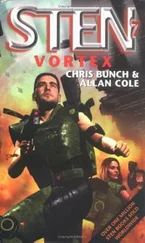It was a reduction in strength he felt sure Havana already regretted.
Vega had held his command for four years, fighting Unita-the guerrilla movement opposing Luanda’s Marxist government-and occasionally Unita’s South
African backers. He knew the area, and he knew his friends and his enemies.
And all sides in the conflict recognized him as a brilliant tactician and a courageous combat soldier.
He pondered the map for a moment, conscious of the eyes fixed on his uniformed back. He tapped a road junction circled in red near the bottom.
“Keetmanshoop may be the first step in South Africa’s invasion, but it cannot be the last. “
His finger traced the road northward and stopped.
“There. That is where they must go to succeed. Windhoek. Namibia’s capital and economic center.”
Vega moved his hand west, to the Namibian coast.
“No competent general would launch a single-pronged attack on such an important objective. There must be a second enemy column moving inland from the enclave at Walvis Bay.
“Two columns. Both converging on Windhoek to trap and crush the Narnibians like this!” He clapped his hands together, startling several of the junior officers in the room.
Others nodded slowly. Vega’s logic was impeccable. With Windhoek in hand and Namibia’s new army smashed or scattered, South Africa would once again control three quarters of its former colony’s mineral wealth and transportation net.
Tejeda looked up from a pad of hastily scribbled notes.
“Did we have any intelligence about South African movements? Was there any warning at all?”
Vega saw every piece of information the DCI, the Cuban intelligence service, collected in Africa. He shook his head.
“Nothing that made a pattern or indicated an operation this massive. But naturally, we’ll go back and reevaluate the data to see if any of it falls into place now.” He nodded to one of the officers, who stiffened to attention and then hurriedly left the room.
Tejeda looked even more worried.
“Can the South Africans win?”
“Certainly, if Pretoria commits enough troops. Troop strength is the key.
Namibia may be weak, but it’s still a huge area-seven times larger than all Cuba.” Vega paused, calculating.
“Vorster and his madmen would have to commit virtually all of their regular forces. That would leave them weak everywhere else.” There was a speculative tone to his last sentence.
“So what can we do to counter this aggression, General?” Tejeda asked.
“Right away?” Vega clasped his hands behind his back, staring at the troop dispositions shown on the map.
“Freeze the withdrawal. No more units should be removed until we know what Unita will do. I’m sure that the South
Africans will use their stooges to try to distract us.”
He spun round from the map, looking for his chief of operations.
“Colonel
Oliva, you will put all our units on immediate alert. Tell them to expect increased Unita attacks. And pass the warning on to the Angolans as well.”
Oliva headed for a phone.
Tejeda stepped closer to Vega.
“I’m sure Havana will agree to stopping the withdrawal. We’ve certainly halted it in the past for less.”
Vega nodded, agreeing, and walked back over to a chair. He sat down heavily.
“Another year and I could have been home. The damned Boers just can’t leave anyone alone. And the Americans. They’re behind this, too.” He grimaced.
“As long as the capitalists have an outpost in Africa, there will be no peace in this region.”
Tejeda looked concerned. Vega rarely showed fatigue or strong emotion.
“Do you have any other recommendations, General?”
“Not at the moment, Comrade Ambassador.” Vega suddenly sounded tired, as if the thought of further service in this cursed country had drained him of energy.
“I may have other ideas when we get more information. “
Tejeda’s secretary entered the Command Center.
“Sir, Minister Fierro is calling.”
Vega left as the ambassador picked up the phone. He had a lot of thinking to do.
CNN HEADLINE NEWS
CNN’s Atlanta-based anchorman managed to convey an impression of dispassionate concern with little deliberate effort.
“Our top story this hour, South Africa’s invasion of Namibia. “
The screen split, showing a stylized map of Namibia in the upper right-hand corner, just over the anchor’s shoulder.
“Roughly eight hours ago, at dawn local time, South African warplanes, paratroops, and tanks struck deep into the newly independent nation of Namibia. Heavy fighting is reported, and there are also unconfirmed reports that UN peacekeeping troops along the
Namibian border have been disarmed and penned in their compounds by units of South Africa’s invasion force. “
The newsman’s dapper image disappeared, replaced by soundless file footage of one of Vorster’s angry, arm-waving speeches. The invasion took most experts by surprise despite Pretoria’s recent claims that black guerrillas have been using the former colony as a staging area for attacks inside
South Africa. “
Vorster’s image disappeared, replaced by that of a grave faced man the anchor identified as a spokesman for the Namibian government.
“This attack is clearly aimed at reestablishing Pretoria’s domination over our country.
Namibia will not surrender. We will not yield. Instead, we call on the
United Nations Security Council for immediate assistance in repelling this aggression.”
The anchorman reappeared, flanked this time by a picture of the White
House.
“In Washington, the State Department has issued a short statement condemning South Africa’s military action. The White House is expected to issue its own statement later in the day.
“In related news, violent incidents inside South Africa have been rising steadily in the wake of President Vorster’s new security measures…. “
CUBAN EMBASSY, LUANDA, ANGOLA
Night had come almost unnoticed to Luanda.
A single hooded lamp cast shadows on the wall as Gen. Antonio Vega sat eating alone in his office, reviewing the latest sketchy intelligence coming out of Windhoek. No clear picture had yet emerged, but one thing was obvious. Namibia’s young army was losing and losing fast. And in a war still less than a day old.
He looked up in intense irritation when Corporal Gomez stuck his head through the door to let him know that the ambassador wanted to see him.
Again.
Vega swore briskly, swept the sheaf of intelligence reports into a neat pile, and strode out the door with Gomez in tow.
Tejeda’s office faced an arc-lit inner courtyard-a safe haven should any of the many Angolans who loathed their country’s nominal protectors decide to turn sniper. The ambassador was now fully and formally dressed, but he looked much worse, plainly a man deprived of needed sleep and having had a very full day.
Tejeda glanced up from the message flimsy he’d been studying carefully.
“We have new orders, General.” His tone was portentous, almost comical, but Vega knew he was serious. The ambassador never joked about orders from Havana. It wasn’t healthy.
Vega took the message from him. It wasn’t long. The important ones never were.
“Cuba has pledged its internationalist support of the Namibian people against South Africa’s imperialist aggression. Under an agreement reached this afternoon with the Swapo government, this will include the deployment of military units in combat operations against Pretoria’s racist invaders.”
Tejeda nodded.
“Radio Havana will broadcast that—he looked at his watch—in about half an hour. I have direct orders for you as well.
Читать дальше












